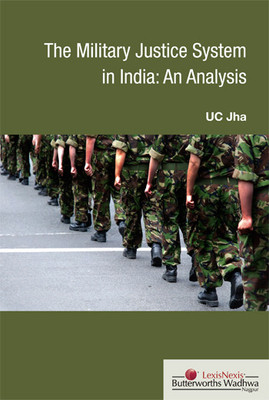The Military Justice System in India 1st Edition(English, Paperback, Jha U C)
Quick Overview
Product Price Comparison
As members of the armed forces, more than 1.5 million Indians are subject to the military justice system. A legal system designed and implemented to serve the interest of colonial masters after the Mutiny of 1857 is still applicable to this group of Indians in the name of discipline. This book discusses the concepts of ŌĆśjusticeŌĆÖ and ŌĆśhuman rightsŌĆÖ, and makes a strong case for the application of these concepts to the armed forces, while maintaining their discipline and operational efficiency. The military justice system is rarely criticised in our countryŌĆöit is generally ignored under the notion that it relates to a handful of uniformed personnel who volunteer to be governed by it. A natural tendency exists within the armed forces to defend the system, calling it ŌĆśtime-testedŌĆÖ. In addition, a veil of secrecy is drawn over military matters. The highlight of this book is a critical analysis of the existing military justice system in India and its comparison with that of the UK and the USA. Across the world, there is a clear trend of change in the military justice system regarding the rights of the accused and the human rights standards. Some important elements of this change are the independence of judges, the establishment of standing courts, the right to legal representation and increased rights of the accused in terms of electing trial instead of summary procedures. This book points out the deficiencies in the Indian military justice system and argues that limitations on human rights must be provided for by law and should be consistent with international treaty obligations. Everybody concerned with the military justice systemŌĆöpolitical leaders, military personnel, social scientists, lawyers and policy makersŌĆöshould read this book. About the Author U C Jha is presently a visiting fellow at the Centre for the Study of Law and Governance, Jawaharlal Nehru University, New Delhi, and a visiting faculty member at a number of law institutions in New Delhi. Dr Jha was invited by the Parliamentary Standing Committee on Defence to present his views on the Armed Forces Tribunal Bill 2005. Many of his recommendations were incorporated in the Tenth Report of the Parliamentary Standing Committee submitted to the Parliament. He has worked as a Consultant (Legal) to the National Human Rights Commission, New Delhi for more than three years. He is also a resource person for the International Committee of the Red Cross on International Humanitarian Law. His works, comprising over 50 articles/research papers on matters relating to the armed forces, humanitarian law and environmental law, have been published in various journals and newspapers. Dr Jha has 24 years of commissioned service to his credit and was a Wing Commander when he took voluntary retirement. He obtained a Ph D degree in law and governance from Jawaharlal Nehru University in 2008, where his dissertation was on the Indian Military Justice System. He also holds masterŌĆÖs degrees in law, life sciences, business administration, defence and strategic studies, with postgraduate diplomas in intellectual property laws, environmental law and international humanitarian law, refugee law and human rights laws.


